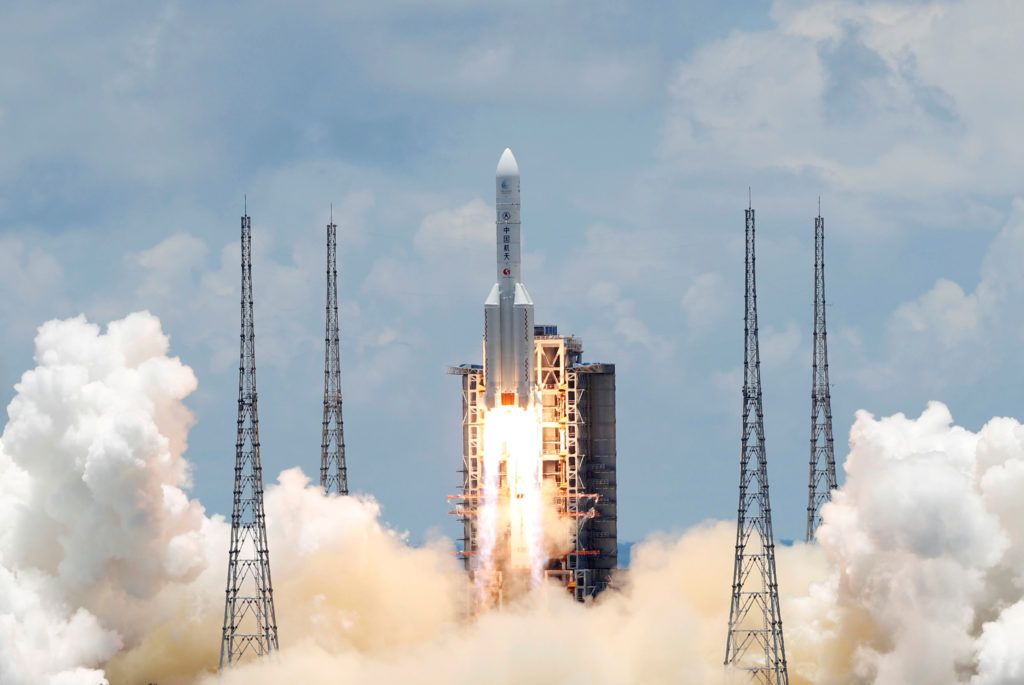China launches Mars probe in an ambitious attempt to land on the Red Planet

A few minutes every morning is all you need.
Stay up to date on the world's Headlines and Human Stories. It's fun, it's factual, it's fluff-free.
In a bold display of their technical prowess, China launched its first independent space probe destined for Mars on Thursday, further establishing their status as a contender in space exploration efforts.
The probe, named Tianwen-1, or “Questions to Heaven” after an ancient Chinese poem, blasted off at 12:41 p.m. (0441GMT) from the Wenchang Space Launch Center on the southern island of Hainan. It is expected to reach Mars’ gravitational field in February 2021.
Less than 45 minutes after its departure, launch commander Zhang Xueyu announced that the 5-ton probe had successfully entered a predetermined orbit and was on its way to the Red Planet.
“The Mars rover has accurately entered the scheduled orbit,” he announced in a live broadcast on Chinese state TV station, CCTV.
This mission marks China’s first solo attempt to travel to Mars after a joint attempt with Russia failed in 2011 due to faulty computer circuits that caused the Russian rocket carrying the Chinese probe to get stalled in low-Earth orbit.
Landing on Mars is no easy feat and has previously only been accomplished by the United States and, briefly, Russia. China, however, has chosen to take an especially ambitious approach with their inaugural Tianwen-1 mission.
The vessel consists of three main components – an orbiter, a lander and a rover. The lander and rover will attempt to descend on the planet’s surface to investigate the conditions on the ground. Meanwhile, the orbiter will circle the planet for one Martian year – 685 days on Earth – and will conduct its own investigations as well as serve as a communication relay for the lander and rover.
“Tianwen-1 is going to orbit, land and release a rover all on the very first try, and coordinate observations with an orbiter,” wrote four program scientists in the Nature Astronomy journal last week.
While the US has achieved these goals, they have never been attempted all at once.
“No planetary missions have ever been implemented in this way,” added researchers. “If successful, it would signify a major technical breakthrough.”
“The mission must necessarily be challenging, and not be following in the footsteps of others completely,” Liu Tonjie, spokesman for the Mars exploration mission, told Reuters.
“This is an exploration project, so there will be no 100% assurance of success. If the mission is unsuccessful, or if there are problems, we will continue to push ahead, re-establish the project, and re-commit,” he added.
This is one of three recent attempts to launch Mars exploration efforts. The United Arab Emirates (UAE) launched an interplanetary satellite on Sunday, while the US’ National Aeronautics and Space Administration (NASA) is expected to deploy their Perseverance rover to Mars as early as the end of July.
The launch also comes as tensions between the US and China have risen over several contentious issues including Beijing’s handling of the coronavirus pandemic, its mistreatment of its Uighur population and other Muslim minorities in the Xinjiang province and its encroachment on Hong Kong’s political and economic freedoms.
When asked whether their rivalry will spread to Mars with this new mission, Liu said to Reuters that the Chinese space program does not intend to compete with anybody, but to cooperate with other global space exploration projects.
“From our point of view, Mars is large enough for multiple countries to explore and carry out missions,” said Liu, stating that it was unlikely for the Chinese rover to cross paths with Curiosity and InSight, two US rovers already on the ground.
The stakes are high for China, whose leader, Xi Jinping, has branded the country’s space exploration program as a pillar of Chinese development in the decades to come.
“There is a lot riding on this,” said Dean Cheng, an expert on China’s space program with the Heritage Foundation in Washington, DC.
“Failure is always a possibility, and the Chinese themselves write about how space is one of the most complex environments to work in,” he said. “But that does not mean they will accept failure gracefully.”
Have a tip or story? Get in touch with our reporters at tips@themilsource.com




Comments ()